Table of Contents
FutureLearn vs Udacity: An Overview
FutureLearn and Udacity are both praised for having an intuitive user interface, high-quality content, and a variety of programs.
Each platform also offers both free and paid course options across various categories, but one of these sites has a more specific offering.
In this detailed review, I outline the details of each eLearning platform to help you decide where you should invest your time and money.
FutureLearn vs Udacity: Who It Is It For?
FutureLearn
FutureLearn touches on a wider variety of topics than Udacity does. The topics range from business, healthcare, IT, law, science, and teaching, to nature and languages. The broad scope makes it suitable for a wider range fo students.
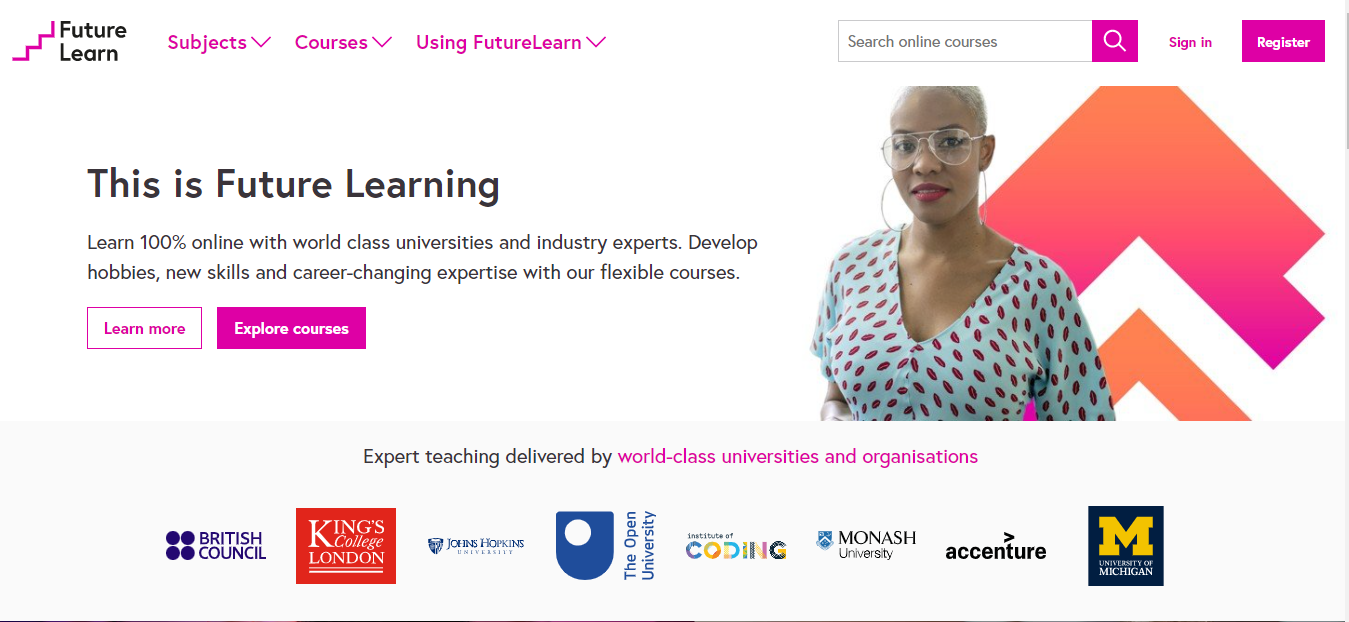
FutureLearn is ideal for learning new skills or brushing up on existing ones. It also offers higher education programs, which are suitable for students who are pursuing careers across in-demand fields.
Udacity
Udacity is a top choice for anyone who is more interested in tech subjects such as software engineering, data analysis, web development, and artificial intelligence.
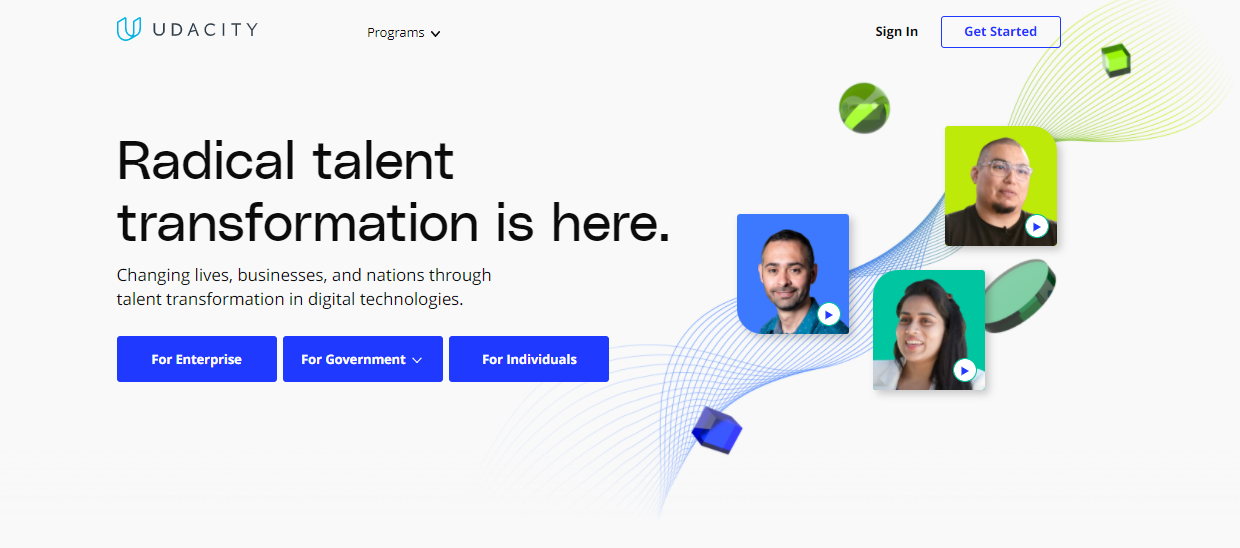
Courses are available for beginners, but also students with intermediate or advanced skills in specific fields. Learners who enroll in Udacity courses get to learn some employable skills based on real-world projects. Unlike FutureLearn, there are no higher education accredited courses on Udacity. This means Udacity isn’t an affordable choice in terms of earning recognized accreditations.
FutureLearn vs Udacity: Types of Courses Offered
FutureLearn
FutureLearn has a wide selection of online learning categories to choose from, including:
- Business and Management
- Creative Arts and Media
- Healthcare and Medicine
- History
- IT and Computer Science
- Language
- Law
- Literature
- Nature and Environment
- Politics and Society
- Psychology and Mental Health
- Science, Engineering, and Math
- Study Skills
- Teaching
And each primary category is made up of several sub-categories, making it easier to find the right course. For example, the Business and Management category includes cyber security training, UX design, CRM fundamentals, data analytics, and more.
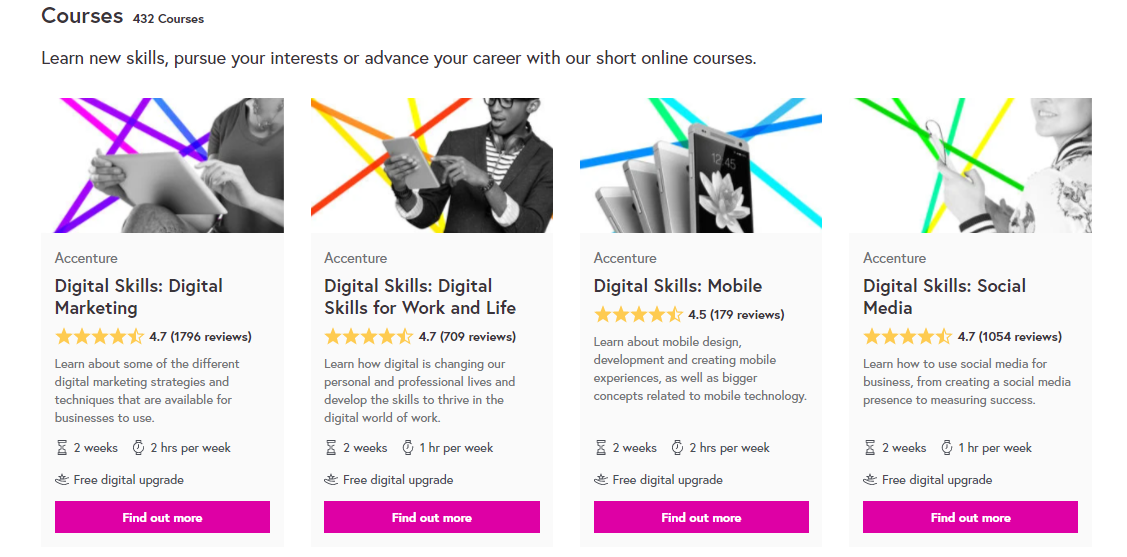
FutureLearn offers a Certificate of Achievement to learners who successfully complete any course. The student receives a certificate when they complete at least 90% of the course steps and get 70% on test questions. Note that the FutureLearn certificate is only available upon purchase.
FutureLearn also has micro-credential programs that serve to verify a graduate’s competence in a particular field. These fully-accredited programs come with 100 hours of study and are best for professionals or students looking to boost their resumes.
Other than the micro-credential programs, FutureLearn has alternative program forms:
- Nine academic accreditation programs that take from ten up to 54 weeks to complete, offering academic credentials.
- Five professional accreditation programs that take 14 to 20 weeks to complete, offering a professional certificate.
So, does this mean FutureLearn is accredited? Yes, the platform offers accredited certificates across microcredential and postgraduate programs.
Note that the ExpertTrack and Unlimited plan programs aren’t accredited.
Udacity
Below are some of the most popular learing categories on Udacity:
- Artificial Intelligence
- Autonomous Systems
- Business
- Cloud Computing
- Cybersecurity
- Data Science
- Programming and Development
- Product Management
These categories are further split into sub-categories. For example, the Business category encompasses courses in agile software development, data science for business leaders, data product manager, SQL, AI for business leaders, business analytics, marketing analytics, and digital marketing.
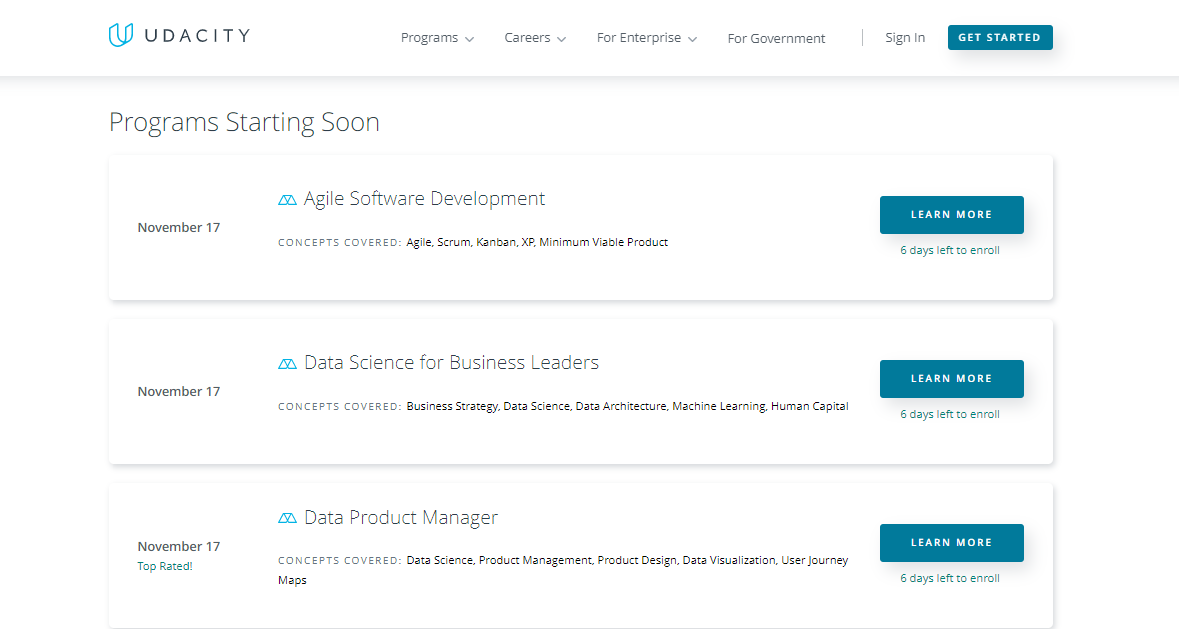
There’s an additional category called Careers, featuring mostly interview preparation courses for tech-related jobs.
Udacity courses are available in two categories: free and paid.
They have 200 free courses for those who want to test the platform. Some free courses are general in scope, addressing questions such as how to polish your resume or boost your LinkedIn network and brand. They also have completely free programs that last from a few days to up to two months, available across a wide range of topics – business analytics, machine learning, cryptography, and more.
Udacity’s paid programs are called nanodegrees. Nanodegrees are micro-credentials that focus on high-demand skills. They consist of human-graded projects and video courses. To earn a nanodegree, users must complete all the projects included in a course. These courses can last from two or three, up to six months.
Upon completion, all graduates get a shareable certificate from their single paid course, nanodegree program, or executive program.
What about Udacity? Is it accredited? No, it isn’t an accredited educational institution, meaning it doesn’t confer any degrees or offer college credits.
FutureLearn vs Udacity: Pricing & Refunds
FutureLearn
The free plan is among the most popular options on this platform. However, FutureLearn free courses are only available for two weeks. Once you upgrade, you can access features like tests, quizzes, and more.
FutureLearn has a paid program called Unlimited. This plan offers users unlimited access to their short courses for $279.99 per year. The Certificate of Achievement is also included in the price, regardless of the discount rate.
Even though the price for the Unlimited plan may seem expensive, it’s far more budget-friendly than Udacity pricing. Even other platforms like Coursera come at a higher cost. However, we wouldn’t do the other two platforms justice if we only compared the pricing. Coursera has even more course options, while Udacity offers more in-demand courses.
FutureLearn recently launched a new subscription model called ExpertTrack, which is designed to provide access to in-demand courses. The cost is $39 per month, where the payment is automatically canceled upon material completion. There’s also a seven-day trial period.
The cancellation and refund policy are quite complex as it depends on the payment model you choose. For paid, upfront courses, including the Unlimited plan, you can get a refund or cancel within the 14-day cooling-off period or if you haven’t completed any tests or received a FutureLearn certificate.
For Microcredential FutureLearn courses, you can cancel or get a refund anytime between the purchase date and when the learning begins. After the learning has started, the policy varies depending on the university. You can find the refund and cancellation details under the description of each microcredential course.
Udacity
Udacity pricing varies across courses. The platform offers almost 200 free courses, single-paid courses, as well as nanodegree programs.
Accessing single, paid courses start at $339 per month.
Executive programs are $799 per month and can take anywhere between one to two months to complete.
Nanodegree programs can cost up to $1,700 for five-month access, given that you spend from five to ten hours per week studying the material. These courses are also available with a pay-as-you-go option that’s $399 per month. This handy offer lets you continue with a course if it takes you more than the estimated five months to finish.
Some nanodegree programs come with a free trial. Users can access videos, learning material, and quizzes to experience the program before investing.
Udacity also has ten scholarship programs sponsored by Google, Lyft, AT&T, and other big companies. They also offer discounts and promotions, but they can vary.
As for the refund policy, Udacity issues a full refund for all programs if a student unenrolls within the first two days of their first month’s subscription. The billing and subscription information can be found in the account settings.
learners who plan on canceling their subscription are advised to do so before the next billing date. This helps avoid additional charges. The content will still be available to users who cancel the subscription before the next billing date but only after the two-day refund period.
FutureLearn vs Udacity: Enrollment & Usability
FutureLearn
Overall, FutureLearn is a fairly straightforward platform to use. The steps include picking an online class from the catalog, choosing a payment plan, and enrolling in the course. The user interface is highly intuitive, and the details of each course are presented in an easily accessible manner.
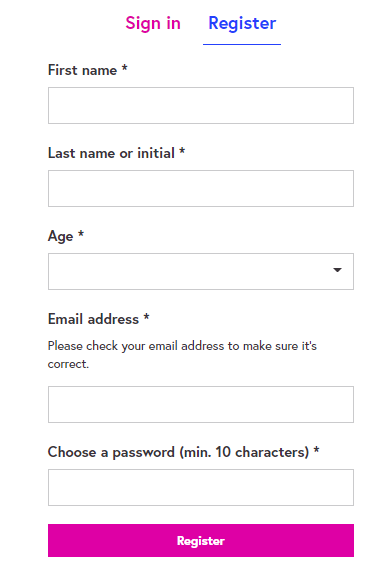
Learners have access to the course syllabus so they can get familiar with the course details before enrolling. Since the courses have a start date, you may not be able to start with a program right away. However, the waiting time shouldn’t be too long for most FutureLearn courses.
You don’t need to have any prior knowledge to enroll in the basic FutureLearn classes.
The higher education courses do come with entry requirements specific to each university. These can include pre-16 qualifications, admission tests, English language skills, and more.
The FutureLearn app is currently unavailable both for Android and iOS users.
Udacity
Udacity is super easy to use. The user interface is structured to make it seamless for learners to jump across categories and search for topics of interest. Once you find a course you like in the course catalog, all it takes is a click on the course name and to select the “Go to Class” button.
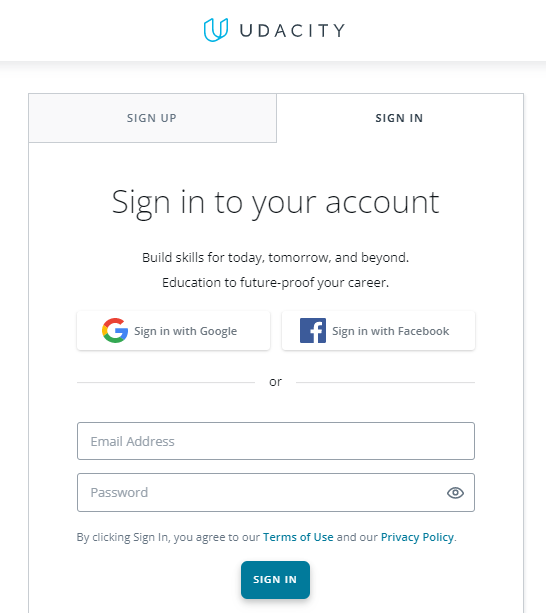
The intuitive, user-friendly interface makes for an enjoyable experience.
Users don’t require any special background knowledge or experience to enroll in a course. However, the courses do come with lists of prerequisites. The platform tells you whether a course is suitable for beginners, intermediate, or advanced learners, as well as how long it takes to complete a course, the skills you’ll learn, and more.
The Udacity app is currently unavailable both for Android and iOS users.
FutureLearn vs Udacity: Course Structures
FutureLearn
FutureLearn offers different course types, including short courses, ExpertTracks, Microcredentials, and online degrees. FutureLearn classes are pre-recorded videos and lectures students can work through whenever it’s convenient for them. Student discussions are also available for each course.
Most courses include homework, assignments, and quizzes and students who pay for certification receive official tests as well.
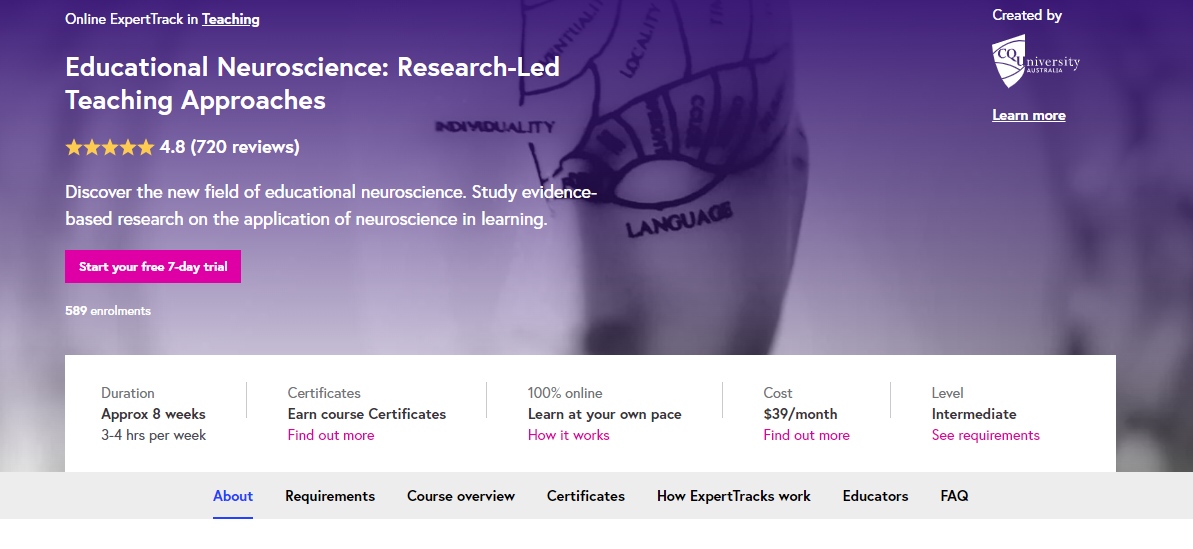
The courses are divided into individual week modules. Each week comes with different activities that need to be completed that week. The activities build upon the previous week’s work. Also, thanks to a clearly outlined course structure, students can easily view future content.
Classes have plenty of learning activities to enjoy, compared to most other online learing platforms. Content includes audio, article reading, video watching, and short quizzes at the end of each section. As you finish a section, you can mark it completed and move on to the next one.
Udacity
Udacity courses are highly interactive. Students receive access to pre-recorded video classes, as well as reading material and additional resources. This means they can learn at a pace that best works for them. Classes also include exercises and quizzes that are interspersed between short videos. Quizzes help you grasp the content as you go.

The video lessons are broken into different topics, and you get to mark each section as complete before moving to the next one.
After a lesson is over, you’ll be assigned a set of exercises you should complete to review the learned material. The courses also include projects such as building blogs, games, apps or manipulating search engines.
The microcredential programs include human-grade projects and mentor support as well.
As for the free courses, they have video lessons and auto-graded quizzes as well.
The Verdict
Our Udacity vs FutureLearn review shows that both platforms offer high-quality courses, but the main difference lies in the course topics and the types of certifications.
Udacity offers top-quality programs to help tech-oriented individuals kickstart a new career. And even though none of them are accredited, they are recognized by employers.
FutureLearn is a better option for those looking for non-tech or business courses. Also, the microcredentials are perfect for individuals who want to gain in-depth knowledge on a specific subject and leave with an accredited certificate.
In the end, both websites will provide you with the value needed to upscale your career or kickstart a new one.
